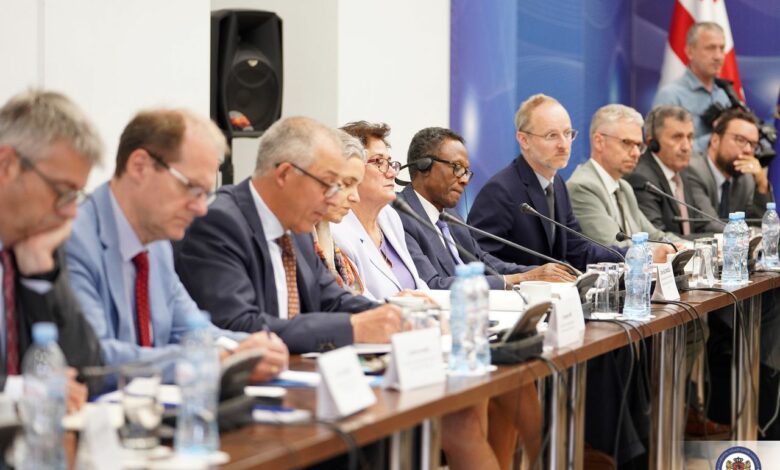
GID Co-Chairs Visit Georgia
From June 2 to 4, the co-chairs of the Geneva International Discussions (GID) from the EU, the UN, and the OSCE visited Tbilisi, Tskhinvali, and Sukhumi and held meetings in preparation for the 64th round of the talks, scheduled for June 25–26.
Visit to Tbilisi
On June 2, the GID Co-Chairs visited Tbilisi and held a meeting at Georgia’s Foreign Ministry. The meeting was led by Lasha Darsalia, the GD Deputy Foreign Minister, the Georgian MFA reported.
The discussions focused on the “importance of the effective functioning” of the Geneva discussions and their next round. The parties emphasized the importance of making progress on the GID’s key agenda items, including Russia’s compliance with the EU-brokered ceasefire agreement and the return of internally displaced persons and refugees.
“The meeting emphasized the necessity to restore the Incident Prevention and Response Mechanism (IPRM) in Gali without any preconditions and to hold regular meetings of the IPRM in Gali and Ergneti in full accordance with its founding principles,” the MFA’s press release adds.
The Georgian side reiterated concerns over dire humanitarian and human rights situation in the Russian-occupied regions, focusing on “Russia’s and its occupation regimes’ destructive and illegal actions” as well as the “attempts to hinder trust-building efforts.” They also raised the issue of Russia simplifying the procedure for granting Russian citizenship to people living in the Abkhazia and Tskhinvali regions.
“The Georgian side once again expressed concern over the illegal operation of Sokhumi airport and the launch of regular flights in the occupied region of Abkhazia, as well as over the launch of railway traffic and direct route of electric train in violation of international law,” the press release adds.
- 03/05/2025 – Russia Launches Direct Flights to Occupied Abkhazia
Magdalena Grono, the EUSR for the South Caucasus and the crisis in Georgia, told Civil.ge that the consultations focused solely on the GID’s core agenda, emphasizing the need for progress on security and humanitarian issues, especially the non-use of force and international security arrangements.
“As you know, the EU is committed to its role in the GID format, a key platform for dialogue,” she said.
Visit to Tskhinvali
On June 3, the GID co-chairs visited occupied Tskhinvali and met with Konstantin Kochiev, head of the so-called South Ossetian delegation. According to the local news agency RES, Kochiev said that following the last round of the Geneva discussions, there were “encouraging signals” regarding the potential development and signing of an agreement on the non-use of force.
“We are also witnessing a certain development in neighboring Georgia, where understanding of what actually happened on South Ossetian soil in 2008 is spreading more and more widely,” Kochiev said, adding, “This opens up additional opportunities for finding and developing coordinated approaches to key points of the Geneva discussions.”
Visit to Sokhumi
On June 4, the GID co-chairs visited Sokhumi and met with Abkhazia’s de facto foreign minister Oleg Bartsits, according to the local news agency Apsnypress.
According to Apsnypress, Bartsits emphasized the need to develop and sign an agreement on the non-use of force with Tbilisi, calling it a “cornerstone” of the Abkhaz side’s continued participation in the GID. Apsnypress also quoted Bartsits as saying the IPRM in Gali remains inactive due to what he described as the “unconstructive position of the Georgian participants.”
During the meeting, de facto foreign minister claimed “stable” situation in Abkhazia. He further claimed that Abkhazia is “developing and actively cooperating with the Russian Federation.”
“Fruitful cooperation with Russia, which is our strategic ally and partner, is the key to our sustainable development We regard our cooperation as comprehensive and intend to strengthen it,” Bartsits said. He added that Abkhazia intends to expand contacts abroad and work toward broad international recognition of the region as a sovereign and independent state.
Also Read:
- 06/03/2025 – 63rd Round of Geneva International Discussions
- 13/02/2025 – GID Co-Chairs Visit Georgia
- 07/11/2024 – 62nd Round of Geneva International Discussions
- 27/06/2024 – 61st Round of Geneva International Discussions
This post is also available in: ქართული